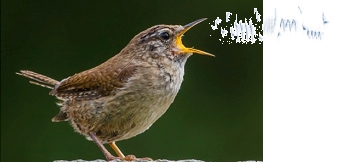
Female songbirds: Make her voice heard!
Listening to birds and helping science, it is possible. Institute of Biology Leiden (IBL) researchers Karan Odom and Katharina Riebel launched a citizen science project to improve the worldwide documentation of female birdsong.
It is spring. After a long winter warm sunshine, flowering plants and singing birds are back. We enjoy listening to bird song, but for the birds it is make or break in this gambit for fitness. They have to sing to attract mates and to defend their territories. The often pronounced sex differences in birds’ song and plumage inspired Darwin’s theory of sexual selection in The Origin of Species from: "female birds, by selecting, during thousands of generations, the most melodious or beautiful males, according to their standard of beauty, might produce a marked effect."
Female and male behaviour
Ever since Darwin, birdsong, like other conspicuous displays and ornaments, have been studied as typical male traits evolved to attract females and to repel rival males. But females of many species are ornamented, too. And female birds of many species also sing. Why? Leiden researchers Karan Odom and Katharina Riebel of the IBL aim to understand why females and males behave alike in some species but differ in others.
A tree full of songs – understanding the evolution of sex differences

Previous research of Odom and Riebel included a worldwide survey showing that singing in both females and males is more widespread than previously thought and most likely the ancestral state. They now investigate how males and females in modern songbirds evolved their often diverse songs. To identify which ecological factors best predict presence or absence of female song, they and other evolutionary biologists need many examples of female and male song from many different songbirds. But female songs are almost absent in biological collections because most bird song research to date has focused on male song only.
Citizen science
To increase the documentation of female song in biological collections, Odom and Riebel now collaborate with the two world leading bird song collections: Xeno-canto (housed at Naturalis Biodiversity Center) and the Macaulay Library (Cornell Laboratory of Ornithology).
"There are many enthusiastic bird watchers worldwide. They regularly collect observations and recordings valuable to research. With this citizen science project, we aim to encourage submitting these observations and recordings to biological collections and to raise awareness as to how this can help to answer interesting and important evolutionary questions. In the long run we aim to integrate these data into our research on the evolution of the striking variation in sex differences in birdsong." - Katharina Riebel
